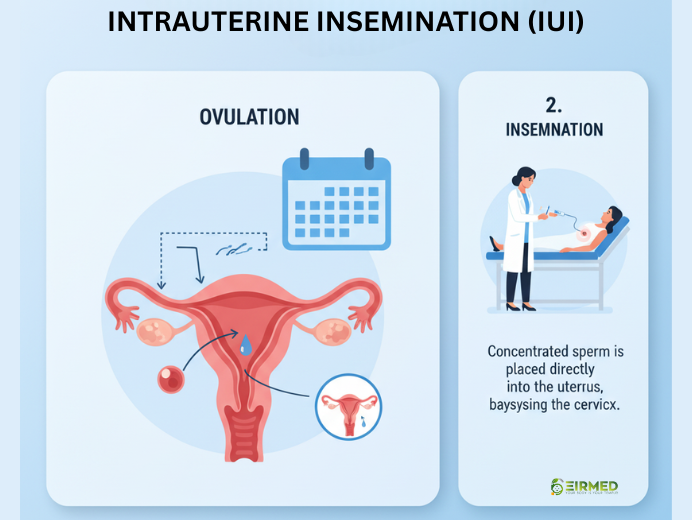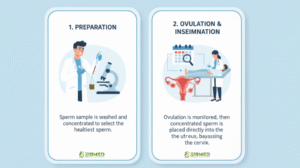Things to Avoid After IUI in 2025

Things to Avoid After IUI for a Smooth Path to Pregnancy
Intrauterine Insemination (IUI) is a common, non-surgical fertility treatment that places washed and concentrated sperm directly into a woman’s uterus around the time of ovulation. While the procedure itself is quick, the subsequent period, often called the “two-week wait,” is crucial for successful implantation.
To optimize your chances of a successful pregnancy and maintain both your physical and mental well-being during this time, it is important to understand what activities, substances, and habits should be avoided. This article provides essential information on things to steer clear of after your IUI procedure.
What Is IUI and How Does It Work?
IUI is a fertility help where washed sperm goes right into your uterus. This makes it easier for sperm to meet the egg. Doctors do it around the time you ovulate, when an egg comes out. It is less hard than IVF and costs less too.

The steps start with meds to help eggs grow, then a shot to release the egg. On the day, it takes just minutes. After, you rest a bit and go home. Many couples try it for issues like low sperm count or unexplained no baby.
At EIRMED, we know IUI can bring hope. Our products for female fertility, like vitamins, can add support.
🏃♀️ Physical Activities and Habits to Modify
Certain physical activities can create unnecessary stress on your body or raise your internal temperature (hyperthermia), which may not be ideal during the sensitive implantation window.
🍹 Substance and Lifestyle Restrictions
Introducing harmful chemicals or substances into your body during the two-week wait can potentially impact implantation or fetal development.
- Eliminate Alcohol Consumption: Since you cannot know immediately if the IUI was successful, you should treat your body as if you are already pregnant. No amount of alcohol is considered safe during early pregnancy.
- Quit Smoking and Avoid Secondhand Smoke: Tobacco use, including both smoking and vaping, is linked to lower implantation rates and negative pregnancy outcomes. All forms of nicotine should be stopped immediately.
- Avoid Excessive Caffeine Intake: While many doctors allow low to moderate amounts, it is wise to limit your daily caffeine intake to less than 200 mg (the equivalent of one small cup of coffee).
- Do Not Take Unapproved Medications: Only take medications that your fertility specialist has explicitly approved. This is crucial for both prescription drugs and over-the-counter medications. Specifically, avoid non-steroidal anti-inflammatory drugs (NSAIDs) like ibuprofen or naproxen, which can potentially interfere with implantation. Always confirm with your doctor first.
🧠 Mental and Emotional Stressors to Minimize
While it is impossible to eliminate all stress, managing your emotional state during the waiting period is vital for your overall well-being. Focus on self-care and distraction.
💰 How Much Does IUI Cost in Texas? A Complete Guide to Fertility Treatment Prices
Intrauterine Insemination (IUI), often called artificial insemination, is one of the most common and lowest-cost ways to treat infertility. If you are starting your fertility journey in Texas, understanding the cost of IUI is key to planning your family.

The price of a single IUI cycle in Texas can vary greatly, generally ranging from $800 to $4,000+ per cycle, not including medication. This wide price range depends on several factors, including the clinic you choose and the type of treatment plan your doctor recommends.
💵 Breakdown: The True Cost of One IUI Cycle (Without Insurance)
When a fertility clinic quotes a price for IUI, they often give a “base price.” However, a full treatment cycle involves many necessary steps, each with its own cost. The actual total cost of IUI comes from adding up these individual parts.
Here is a simple look at the major cost parts for one IUI cycle in Texas:
I. Core IUI Procedure Fee
This is the price for the main event: preparing the sperm and performing the insemination.
II. Essential Monitoring and Testing
To time the IUI perfectly and ensure safety, your doctor must monitor your cycle with blood tests and ultrasounds. These fees often add up quickly.
III. Medication Costs
The type of medication you take to stimulate your ovaries makes the biggest difference in the final price of the cycle.
Takeaway: For a fully monitored IUI cycle using oral medications and a trigger shot, the “all-in” out-of-pocket cost usually falls in the range of $2,000 to $4,000 in Texas.
🔍 Key Factors That Change the Final Price
The cost of IUI is not fixed. Several factors can either lower the price or cause unexpected costs.
- 1. Type of Medication: This is the biggest variable. A natural cycle (no drugs) is cheapest, followed by oral drugs. Using injectable hormones (Gonadotropins) for stronger egg production is much more expensive.
- 2. Monitoring Frequency: Some doctors require more frequent blood tests and ultrasounds than others. More monitoring visits mean higher bills.
- 3. Clinic Location and Pricing: Prices can differ between major cities like Houston, Dallas, or San Antonio versus smaller Texas communities. Larger, high-tech clinics may have higher fees.
- 4. Need for Donor Sperm: If you are using donor sperm (common for single women or same-sex couples), you must factor in the cost of buying the sperm vial, which is separate from the IUI procedure cost.
🛡️ Does Insurance Cover IUI in Texas?
Understanding your health insurance coverage is essential, as this can dramatically reduce your out-of-pocket cost.
- Texas Has No State Mandate: Unlike some states, Texas does not have a law that forces all health insurance companies to cover fertility treatments like IUI or IVF.
- Employer-Based Coverage: Coverage depends entirely on your specific insurance plan and what your employer decided to include.
- Some plans cover only diagnosis (initial tests, bloodwork, ultrasounds).
- Other plans may cover up to three cycles of IUI or offer a generous lifetime maximum benefit that can be used for IUI.
- What to Check: Always call your insurance provider directly. Ask them these three key questions:
- Is IUI (procedure code 58322) covered under my plan?
- Are the required monitoring visits (ultrasounds and bloodwork) covered?
- Are my fertility medications covered under my pharmacy benefit?
IUI vs. IVF: A Quick Cost Comparison
While IUI costs are significant, they are much lower than In Vitro Fertilization (IVF). This is why many doctors suggest IUI as a starting point.
🧬 Can You Have Intercourse After IUI? Scientific Evidence & Expert Recommendations
The question of can you have intercourse after IUI is common, and the answer, supported by medical research, is generally yes. Many fertility specialists not only permit but actively encourage timed intercourse following an Intrauterine Insemination (IUI) procedure.

This practice is considered safe and, in certain patient groups, may offer a simple way to slightly improve success rates.
🔬 Scientific Rationale: Why Sex May Help IUI Success
While the IUI procedure places washed sperm directly into the uterus, having intercourse at the right time may provide a physiological “boost” to the conception process.
1. Uterine Contractions and Sperm Transport
- The Mechanism: Female orgasm triggers natural contractions of the uterus (womb).
- The Benefit: Researchers suggest these uterine contractions may act like a pump, helping to move the recently placed sperm further up toward the fallopian tubes, where fertilization occurs. This ensures a higher concentration of sperm reaches the egg.
2. The Role of Seminal Plasma
- The Mechanism: Semen contains seminal plasma, which is rich in signaling molecules called prostaglandins.
- The Benefit: Studies in fertility research suggest that exposure to seminal plasma around the time of conception may help promote a more receptive environment in the uterus lining. While more research is ongoing, this exposure is thought to influence the immune response, potentially aiding successful embryo implantation days later.
3. Evidence in Specific Patient Groups
- Key Study Finding: One prospective study compared IUI alone versus IUI combined with timed intercourse within a 12-18 hour period. The results indicated that for patients with lower numbers of motile sperm used for insemination (less than 40 million), adding timed intercourse significantly increased the pregnancy rates compared to IUI alone. For couples with higher sperm counts, the benefit was not statistically significant, but it shows a positive, low-cost intervention for some.
- Source: Study on Timed intercourse after intrauterine insemination for treatment of infertility.
⏰ Scientifically Optimal Timing for Intercourse
The timing is what matters most. Experts recommend aligning intercourse with the peak fertility window, which is controlled by the “trigger shot” (hCG injection) used to time ovulation.
⚠️ Safety First: When to Avoid Intercourse
While intercourse is generally safe after IUI, your fertility doctor may advise you to abstain temporarily in the following medical scenarios to prevent complications:
- Ovarian Hyperstimulation Syndrome (OHSS) Risk: If fertility medications caused your ovaries to become highly enlarged or swollen, deep penetration can cause pain or, in rare cases, a twisted ovary (torsion).
- High Multiple Pregnancy Risk: If ultrasound monitoring showed an excessive number of mature follicles, your doctor may strongly advise against any unprotected intercourse to minimize the risk of a high-order multiple pregnancy (triplets or more).
- Bleeding or Discomfort: If you experienced significant bleeding or cramping during the IUI procedure, waiting for 24–48 hours helps with comfort and healing.
In summary, the medical consensus supports that you can have intercourse after IUI, particularly within 24–48 hours of the procedure, as it is a safe practice that may offer modest benefits, especially in cases with sub-optimal sperm quality.
🎥 Essential Video Guide: : Things to Avoid After IUI
The video features Dr. Kurt Peterson, a reproductive endocrinologist, who provides a comprehensive guide to the Intrauterine Insemination (IUI) process. The goal of IUI is to place optimized sperm near the time of ovulation to increase pregnancy chances.
Title: IUI Explained | What is the IUI process step by step?
Overall Purpose
This guide helps you learn things to avoid after IUI to raise your pregnancy chances. It explains why skip hard exercise, alcohol, heat, and more with easy tips. You get facts on food, meds, and habits from trusted sources. At EIRMED, we support with safe items for fertility. Use this to make good choices, feel less worry, and stay healthy during the wait. Knowledge makes the path clearer.
Common FAQs on IUI
Q1: What are the most important activities to avoid immediately after an IUI procedure?
The main activities to avoid are those that can cause physical stress or increase the risk of infection.
- Avoid Strenuous Exercise/Heavy Lifting: Refrain from high-impact workouts, running, heavy weight lifting (typically anything over 4–5 kg or 10 lbs), or any activity that causes abdominal strain for at least 24 to 48 hours. Opt for gentle activities like light walking.
- Avoid High Heat Exposure: Skip hot tubs, saunas, hot baths, and steam rooms for the two-week waiting period. Elevated body temperature can potentially interfere with the implantation process.
- Avoid Swimming: You should avoid swimming in pools, hot tubs, or natural bodies of water for at least 48 to 72 hours to reduce the risk of infection.
Q2: Should I avoid caffeine, alcohol, and smoking after IUI?
Yes, you should strictly avoid or significantly limit all three.
- Alcohol and Smoking: Both should be completely avoided as they can negatively impact hormone levels, reduce fertility, and pose risks to an early pregnancy.
- Caffeine: It is generally recommended to limit caffeine intake to no more than 200 mg per day (approximately one 12-ounce cup of coffee).
You should avoid non-steroidal anti-inflammatory drugs (NSAIDs) such as ibuprofen (Advil, Motrin) and Naproxen (Aleve) unless specifically instructed by your fertility doctor. These can sometimes interfere with implantation. Always consult your doctor before taking any new over-the-counter medication or supplements.
Q4: Can you have intercourse after IUI, and is it safe?
Yes, sex after IUI is generally safe and often encouraged.
- Many fertility specialists suggest having intercourse the evening of the IUI procedure or within 24 to 48 hours afterward.
- Why it’s recommended: The uterine contractions caused by orgasm may theoretically help move the sperm toward the egg. It also provides a moment of emotional connection during a stressful time.
Q5: When should I avoid intercourse after IUI?
Your doctor may advise against intercourse in certain situations, including:
- If you experience significant discomfort, pain, or heavy spotting after the procedure.
- If you are at risk for Ovarian Hyperstimulation Syndrome (OHSS) due to enlarged ovaries from fertility medication.
- If your risk of a high-order multiple pregnancy is elevated (e.g., due to a high number of developing follicles).
Q6: How much does an IUI cycle typically cost in Texas without insurance?
The cost of one IUI cycle in Texas can vary widely by clinic and what is included in the “cycle package.”
- IUI Procedure Only: Costs often range from $300 to $2,500 per cycle, but this rarely includes everything.
- Monitored Cycle (more common): A cycle that includes monitoring (ultrasounds and blood tests), sperm preparation, and the insemination procedure itself is often quoted in the range of $1,250 to over $2,000.
- Total Out-of-Pocket: When factoring in fertility medications (which are a separate cost and can range from $10 to over $3,000 depending on the drugs used), the total out-of-pocket expense for one cycle can be substantial.
Q7: How much does an IUI cost with insurance in Texas?
In Texas, unlike some other states, there is no state law mandating insurance coverage for infertility treatment. Therefore, coverage depends entirely on your specific insurance plan.
- If your plan covers IUI: Your cost will be limited to your copay, deductible, and co-insurance for the covered services. You may still have a separate out-of-pocket cost for medications, as drug coverage can be separate.
- If your plan only covers diagnostic testing: Your initial doctor visits and bloodwork may be covered, but the IUI procedure and medications will be out-of-pocket.
- Key Action: Always contact your insurance provider directly to verify your “infertility benefit” coverage, including any limits on the number of cycles or a maximum dollar amount they will pay.
Q8: Should I avoid specific foods or supplements after IUI?
Beyond general healthy eating, you should follow early pregnancy food safety guidelines, which are not consistently listed on IUI sites:
- Avoid High-Mercury Fish: Limit consumption of high-mercury fish like swordfish, shark, tile fish, and King Mackerel. Low-mercury options like salmon and canned light tuna are generally safe in moderation.
- Avoid Food Safety Risks: Steer clear of unpasteurized dairy, soft cheeses (unless made with pasteurized milk), under cooked or raw meats, and raw fish (like sushi).
- Limit Certain Produce (Controversial but searched): Some clinics advise patients to consult with a doctor before consuming large amounts of certain fruits like pineapple core or papaya, as some believe they could potentially cause uterine contractions or act as blood thinners. This is highly controversial and often seen as an “avoid if concerned” precaution.
Q9: Do I need to worry about household chemicals or environmental exposure after IUI?
Yes, as a precautionary measure during the two-week wait, many doctors suggest:
- Minimizing Exposure to Harsh Chemicals: Use gloves when cleaning and avoid using harsh chemical cleaners, pesticides, or solvents.
- Avoiding Certain Plastics: Limit or avoid contact with plastics containing BPA, phthalenes, or parabens (often found in some food containers and cosmetics) as these are endocrine-disrupting chemicals.
Q10: What is the best sleeping position after IUI to help implantation?
There is no scientific evidence that any specific sleeping position (side, back, or stomach) increases the success of implantation after IUI. After a brief rest period at the clinic (15-30 minutes), you can sleep in whatever position is most comfortable for you. Prioritizing a good night’s sleep is more important than your physical position.
Q11: What are “implantation cramps” after IUI, and how are they different from side effects?
Many people confuse normal post-IUI symptoms with implantation.
Disclaimer
This info is for learning and not doctor advice. Always talk to your health pro before changes. EIRMED products help but do not promise success. Results differ. We use open web facts, but check with experts for your case.
Thank You
Thank you for reading about things to avoid after IUI. We hope these tips make your wait easier and bring good news. At EIRMED, we are here with products for your needs. Take care and stay hopeful.

Eirmed is an informational platform dedicated to providing reliable, science-based insights on male and female fertility, reproductive health, and natural conception.

Sunduğu incelemeler bilgi açlığınızı doyuracak; düşündürücü ve özenli.